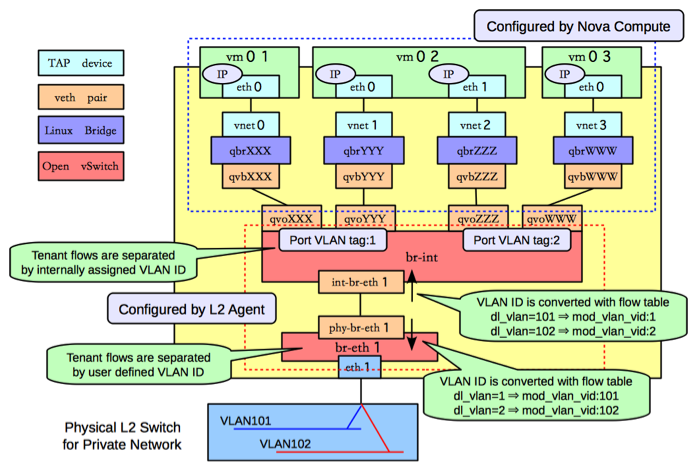问题导读
1、openstack neutron定义四种网络模式分别是什么?
2、Loca网络l模式是如何配置的?
3、Vlan网络模式是如何配置的?
4、Vlan网络模式的网络节点与计算节点比较。

openstack neutron中定义了四种网络模式: # tenant_network_type = local # tenant_network_type = vlan
# Example: tenant_network_type = gre # Example: tenant_network_type = vxlan 本文主要以vlan为例,并结合local来详细的分析下openstack的网络模式。
1. local模式
此模式主要用来做测试,只能做单节点的部署(all-in-one),这是因为此网络模式下流量并不能通过真实的物理网卡流出,即neutron的integration bridge并没有与真实的物理网卡做mapping,只能保证同一主机上的vm是连通的,具体参见RDO和neutron的配置文件。
(1)RDO配置文件(answer.conf)
主要看下面红色的配置项,默认为空。 openswitch默认的网桥的映射到哪,即br-int映射到哪。 正式由于br-int没有映射到任何bridge或interface,所以只能br-int上的虚拟机之间是连通的。 流量最后从哪块物理网卡流出配置项 # Type of network to allocate for tenant networks (eg. vlan, local,gre) CONFIG_NEUTRON_OVS_TENANT_NETWORK_TYPE=local
# A comma separated list of VLAN ranges for the Neutron openvswitch # plugin (eg. physnet1:1:4094,physnet2,physnet3:3000:3999) CONFIG_NEUTRON_OVS_VLAN_RANGES=
# A comma separated list of bridge mappings for the Neutron # openvswitch plugin (eg. physnet1:br-eth1,physnet2:br-eth2,physnet3:br-eth3) CONFIG_NEUTRON_OVS_BRIDGE_MAPPINGS=
# A comma separated list of colon-separated OVS bridge:interface # pairs. The interface will be added to the associated bridge. CONFIG_NEUTRON_OVS_BRIDGE_IFACES= |
(2)neutron配置文件(/etc/neutron/plugins/openvswitch/ovs_neutron_plugin.ini) [ovs]
# (StrOpt) Type of network to allocate for tenant networks. The # default value 'local' is useful only for single-box testing and # provides no connectivity between hosts. You MUST either change this # to 'vlan' and configure network_vlan_ranges below or change this to # 'gre' or 'vxlan' and configure tunnel_id_ranges below in order for # tenant networks to provide connectivity between hosts. Set to 'none' # to disable creation of tenant networks. # tenant_network_type = local |
RDO会根据answer.conf中local的配置将neutron中open vswitch配置文件中配置为local
2. vlan模式
大家对vlan可能比较熟悉,就不再赘述,直接看RDO和neutron的配置文件。
(1)RDO配置文件 # Type of network to allocate for tenant networks (eg. vlan, local,
# gre) CONFIG_NEUTRON_OVS_TENANT_NETWORK_TYPE=vlan //指定网络模式为vlan
# A comma separated list of VLAN ranges for the Neutron openvswitch # plugin (eg. physnet1:1:4094,physnet2,physnet3:3000:3999) CONFIG_NEUTRON_OVS_VLAN_RANGES=physnet1:100:200 //设置vlan ID value为100~200
# A comma separated list of bridge mappings for the Neutron # openvswitch plugin (eg. physnet1:br-eth1,physnet2:br-eth2,physnet3 # :br-eth3) CONFIG_NEUTRON_OVS_BRIDGE_MAPPINGS=physnet1:br-eth1 //设置将br-int映射到桥br-eth1(会自动创建phy-br-eth1和int-br-eth1来连接br-int和br-eth1)
# A comma separated list of colon-separated OVS bridge:interface # pairs. The interface will be added to the associated bridge. CONFIG_NEUTRON_OVS_BRIDGE_IFACES=br-eth1:eth1 //设置eth0桥接到br-eth1上,即最后的网络流量从eth1流出 (会自动执行ovs-vsctl add br-eth1 eth1 |
此配置描述的网桥与网桥之间,网桥与网卡之间的映射和连接关系具体可结合《图1 vlan模式下计算节点的网络设备拓扑结构图》和 《图2vlan模式下网络节点的网络设备拓扑结构图 》来理解。
思考:很多同学可能会碰到一场景:物理机只有一块网卡,或有两块网卡但只有一块网卡连接有网线,此时,可以做如下配置
(2)单网卡 CONFIG_NEUTRON_OVS_BRIDGE_MAPPINGS=physnet1:br-eth0 //设置将br-int映射到桥br-eth10
# A comma separated list of colon-separated OVS bridge:interface # pairs. The interface will be added to the associated bridge. CONFIG_NEUTRON_OVS_BRIDGE_IFACES= //配置为空 |
这个配置的含义是将br-int映射到br-eth0,但是br-eth0并没有与真正的物理网卡绑定,这就需要你事先在所有的计算节点(或网络节点)上事先创建好br-eth0桥,并将eth0添加到br-eth0上,然后在br-eth0上配置好ip,那么RDO在安装的时候,只要建立好br-int与br-eth0之间的连接,整个网络就通了。
此时如果网络节点也是单网卡的话,可能就不能使用float ip的功能了。
(3)双网卡,单网线
CONFIG_NEUTRON_OVS_BRIDGE_MAPPINGS=physnet1:br-eth1 //设置将br-int映射到桥br-eth1
# A comma separated list of colon-separated OVS bridge:interface # pairs. The interface will be added to the associated bridge. CONFIG_NEUTRON_OVS_BRIDGE_IFACES=eth1 //配置为空 |
还是默认都配置到eth1上,然后通过iptables将eth1的流量forward到eth0(没有试验过,不确定是否可行)
3. vlan网络模式详解

图1 vlan模式下计算节点的网络设备拓扑结构图
首先来分析下vlan网络模式下,计算节点上虚拟网络设备的拓扑结构。
(1)qbrXXX 等设备
前面已经讲过,主要是因为不能再tap设备vnet0上配置network ACL rules而增加的
(2)qvbXXX/qvoXXX等设备
这是一对veth pair devices,用来连接bridge device和switch,从名字猜测下:q-quantum, v-veth, b-bridge, o-open vswitch(quantum年代的遗留)。
(3) int-br-eth1和phy-br-eth1
这也是一对veth pair devices,用来连接br-int和br-eth1, 另外,vlan ID的转化也是在这执行的,比如从int-br-eth1进来的packets,其vlan id=101会被转化成1,同理,从phy-br-eth1出去的packets,其vlan id会从1转化成101
(4)br-eth1和eth1
packets要想进入physical network最后还得到真正的物理网卡eth1,所以add eth1 to br-eth1上,整个链路才完全打通
图2 vlan模式下网络节点的网络设备拓扑结构图
网络节点与计算节点相比,就是多了external network,L3 agent和dhcp agent。
(1)network namespace
每个L3 router对应一个private network,但是怎么保证每个private的ip address可以overlapping而又不相互影响呢,这就利用了linux kernel的network namespace
(2)qr-YYY和qg-VVV等设备 (q-quantum, r-router, g-gateway)
qr-YYY获得了一个internal的ip,qg-VVV是一个external的ip,通过iptables rules进行NAT映射。
思考:phy-br-ex和int-br-ex是干啥的?
坚持"所有packets必须经过物理的线路才能通"的思想,虽然 qr-YYY和qg-VVV之间建立的NAT的映射,归根到底还得通过一条物理链路,那么phy-br-ex和int-br-ex就建立了这条物理链路
|  /2
/2 